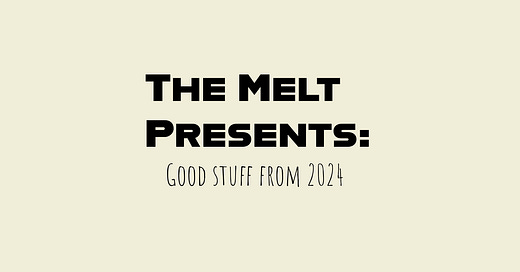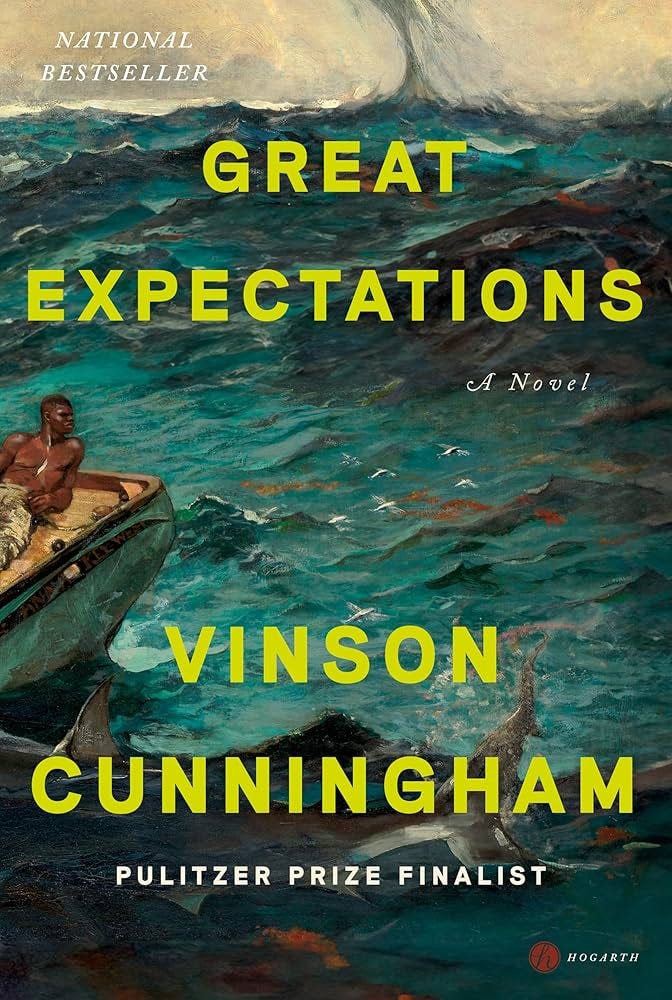It’s that time of the year when you try to escape the news of the world and keep bumping into best-of lists, and I’m sorry to say that I’m also guilty of assuming you care about the things I liked this year. In December, there will be a favorite restaurants post when I’ve had time to, um, digest everything from the last 365, so this is books, TV, and movies. Oddly missing from this list is my favorite new music. The excuse is simply that I became a dad in May, and even though I spend a lot of time watching and fawning over my child, and we have a “no screens on when she’s around” policy, I still got to read and watch a lot, it was much more selective. I couldn’t take a chance on crap, but I also didn’t have much time to check out new albums because I was busy playing Yo-Yo Ma or Ella Jenkins for Lulu. She’s graduated into other stuff, but I was trying to start her off right, so playing some new hardcore 7” or an album described as sounding like “Ornette Coleman in a Berlin loft with Prince’s backing band trying to turn Lou Reed’s Metal Machine Music into a funk record”—which doesn’t exist, but I sort of wish it did—wasn’t as easy as picking up a book after the kid dozed off.
With that out of the way, I give you my favorite books:
Favorite non-fiction book of the year: Miss May Does Not Exist: The Life and Work of Elaine May, Hollywood’s Hidden Genius by Carrie Courogen
What do you want when you read a biography? The story of the subject, right? That’s the point, and Carrie Courogen understood the assignment. She didn’t want to simply write a book about May, but the book on a person that I personally have no issue calling a genius. Besides the obvious research and writing hardships, it would sound like a task that one could accomplish since May is 92 and lives just a subway card swipe away from Courogen. Also, let’s be honest here: not many people have the good sense to care enough about May’s work to want to write a book about her. That’s more an indictment of 99.9 percent of the population and not May, who you may remember I called a genius a few sentences earlier.
One problem: you can find more than a few examples of Courogen’s obsession being described as “difficult,” and a person who feels no need to explain her work or tell her story. That might frighten off any other would-be biographers, but May’s reluctance is exactly what Courogen needed to write a book that is truly worthy of the subject, her career, and life. Since her days working with Mike Nichols in the famed comedy duo Nichols & May, saying May has always been the sort of person who marched to the beat of her own drum is both cheesy and underselling it. The truth is that the great thread from those days through her entire career acting, writing, and directing is May seemingly has always given zero fucks, and those of us that love to say 1987’s Ishtar is a classic and everybody who says otherwise is dumb appreciate that about her. She gave zero fucks if some writer wanted to tell her story, so Courogen had to piece everything together, and the way it played out makes it into her book. It also accomplished the seismic task of making May even more interesting than I thought before I read the book.
I talked with Courogen this past June about the book and her experience writing it, and I think I’ve forced about a dozen people to buy the biography in front of me since then. If you aren’t one of them, then consider this sentence me shoving a copy under your nose and telling you to take out your credit card.
Favorite novel of the year: Great Expectations by Vinson Cunningham
It’s interesting to watch a generation age through fiction. I started reading fiction when the Boomers were churning out novels that did more looking back, and the Xers were still trying to make sense of it all. It’s natural: you get older, tend to get more reflective, and you’ve seen enough that even the slightest hint of cynicism is understandable. The media's fascination with Gen. Z started replacing its obsession with countless articles of the things the previous generation “killed” a few years ago as the first millennials moved past the 40-year mark, and I’m expecting to see more books looking back on the millennial fever dream of the first 15 years of the 21st century over the next few years. I’m sure there will be some good ones, but I’m unsure they’ll have the same energy as Vinson Cunningham’s debut. I kept thinking if he’d waited a few more years to write Great Expectations that maybe it wouldn’t have the same snap because time has a way of chilling us out. Instead, you understand from the first page why he decided his novel should share a title with one of Charles Dickens’ classics, and you close it remembering how an entire generation was sold on the idea of “Hope” at one point. That hope seems to have fizzled out for a lot of folks, but Cunningham was able to capture the feeling and bottle it up between the pages.
It probably shouldn’t come as much of a surprise that, much like the 19th-century classic it shares a name with, Great Expectations is a coming-of-age novel. And while it is protagonist David Hammond’s (and to some extent, Cunningham’s) story, the book also shares space on the shelf alongside countless other American novels from the last century that explore how certain groups of people tried to find their footing in a constantly changing America. And it’s understandable if you forget it now, but 2008 had a particularly intoxicating vibe, especially coming out of the 9/11 and Bush 2 era. People were literally acting like the revolution was happening. They were holding Obama bake sales and writing songs about the bright future ahead of us. Racism was going to be a thing of the past—at least that’s what some white people thought. I don’t recall any Black people I know saying that, and I don’t know how many would have because they knew better.
Whether Cunningham was conscious of this or not, some of the greatest American coming-of-age novels are just as much about the groups the protagonists come from as the protagonists themselves. There are books written by Jewish-Americans, Chinese-Americans, Indian-Americans, and nearly every other group that has had to struggle and adapt to find any bit of comfort in this country. And since no group has had to struggle and adapt as long and as constantly as Black Americans have, there are plenty of great works set across the centuries you can pick up for a better understanding of what it was like if you didn’t experience it first-hand. Cunningham’s debut is a tale of what it was like to be a Black person in America around 2008 while people were getting high off great expectations, but he also had me thinking of Margo Jefferson’s 2015 memoir Negroland, and any other book that reminds us that no group is a monolith. There are always groups within groups, and Cunningham deftly explores the different tiers of Black American power, fame, and wealth. It’s expertly done, and only adds to my belief that Great Expectations won’t take long to mature into what people consider a “modern classic.”
My other favorite books of 2024
Novels:
Housemates by Emma Copley Eisenberg
The Winner by Teddy Wayne
Long Island Compromise by Taffy Brodesser-Akner
Non-fiction:
The Barn: The Secret History of a Murder in Mississippi by Wright Thompson
Grief Is For People by Sloane Crosley
Paper of Wreckage: The Rogues, Renegades, Wiseguys, Wankers, and Relentless Reporters Who Redefined American Media by Susan Mulcahy and Frank DiGiacomo
The Freaks Came Out to Write: The Definitive History of the Village Voice, the Radical Paper That Changed American Culture by Tricia Romano
My favorite movies of 2024:
Between the Temples
Anora
His Three Daughters
My favorite television of 2024:
The Curse
Wise Guy: David Chase and The Sopranos
Bad Monkey
Hacks season 3
Cristin Milioti on Penguin and the entire cast of Agatha All Along.
And I’m not caught up on the new season of Fargo, but I’m going to guess I’ll add it here once I am.






The extent to which Cunningham nailed the, uh, unnamed presidential candidate in question’s very specific speech cadences was just remarkable.
Thank you for such kind words, Jason :')